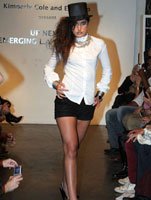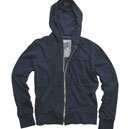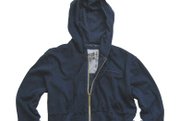Green Collective: Betting on Eco
Erik Stuebe crafted the styles of the Blue Marlin sportswear label with a nostalgic look. However, the 40-year-old entrepreneur said he believes that the future will increasingly belong to those who take a gamble on eco-friendly clothing.
From his San Francisco– based headquarters, Stuebe forecasted that fashion consumers will increasingly demand environmentally minded clothing in the same way that Americans have developed big appetites for organic foods. (According to Boulder, Colo.–based market-research publication Nutrition Business Journal, Americans spent $15 billion on organic foods in 2006. In 2007, they are forecast to spend more than $17 billion on organic food.)
Stuebe debuted the environmentally minded Green Collective at the Project Global Trade Show in Las Vegas. While the 30-piece collection was designed for men ages 24 to 40, Stuebe hopes that it will serve as an environmental plea to all consumers. The small collection also may hold the key to the future of the privately held Blue Marlin Corp., which is sold at 500 retailers, including Macy’s and Nordstrom.
By 2010, the entire Blue Marlin collection, ranging from baseball caps to track jackets, will be made from environmentally friendly and sustainable materials, according to Stuebe. It will come at a cost, though. He estimated that his Blue Marlin products will be priced 20 percent to 40 percent higher because of the use of ecologically friendly materials. However, he said eco-textiles might eventually come down in price as ecofriendly materials are grown and distributed on a greater scale.
Spring 2008 is Green Collective’s first season. It includes T-shirts, Henleys and track jackets made from eco-friendly materials, including organic cotton and bamboo.
The Blue Marlin chief gave the name “Classics” for the slim-fit looks of Green Collective’s T-shirts and hoodies. He wants them to stay in men’s wardrobes for the next few decades. However, he said he also hopes that de t a i l s such a s green stitching and paisley patterns on the neck tape of the collective’s polo shirts will be fashion-forward enough to catch the eye of his market.
While more manufacturers debut new eco-friendly collections, retailers are still testing how the public responds to environmentally friendly clothes. Dave Hollander, president of Becker Surf & Sport, based in Hermosa Beach, Calif., said that none of his environmentally minded clients—surfers and skateboarders—have specifically requested eco-friendly clothes at his store. Rather, they are interested in fashionable clothes at an affordable price.
On the other hand, Laura Abeyta, owner of Venice Beach, Calif.–based boutique (H)armonie, said a mention of a fashion label’s eco-friendly practices often closes a deal and influences a consumer to buy a garment.
For more information, contact Alex Navarro at (212) 242-3650 or e-mail alexn@bluemarlincorp.com.—Andrew Asch
























